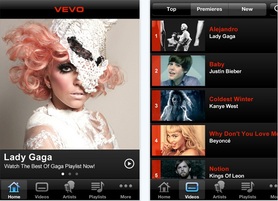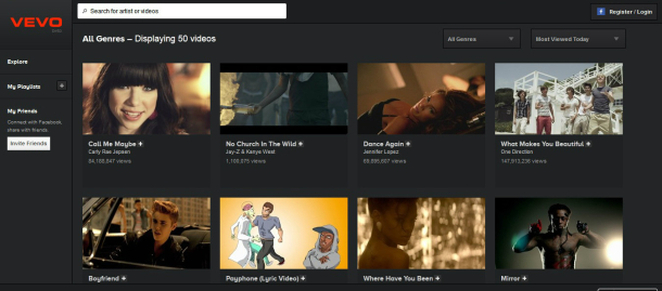 The past and future of Music television? By: Alex Templar -MSTv Additional info from BBC-Newsbeat If you were to ask true purists of music television genre, they'd probably say the concept "died" around the mid to late 90's. Contributing to the demise and around that time, first run videos and general music began appearing online, "reality" TV started its climb to the brainless fare it is now and MTV/VH1 just stopped (kinda) airing their namesakes. The phrase, "where's the music on MTV?" permeated the youth slang lexicon at the turn of the 21th century. But, good idea don't stay dead forever, they just evolve into new forms. And for 2013, that form might be called Vevo TV; which is making its debut in Great Briton. The online music video service Vevo says one of the reasons it is launching a UK TV channel is because there aren't enough opportunities for artists to appear on television. But broadcasters like the BBC say viewing habits have changed, with audiences consuming music programming on an on-demand basis. Plus, some artists say there are now fewer opportunities to appear on TV. TV opportunities Nic Jones, Vevo's international senior vice-president, said: "We think Vevo is the answer to that and we totally believe there is a place for it."  The BBC produces 250 hours of original aired music programming every year and they saw the massive decline in audiences because the way we consume music has changed so dramatically. And the preferred way of consumerism is online. However, television remains a viable and desired platform because music production companies retain strong relations with digital and terrestrial TV stations. Vevo's Nic Jones says there is a "catch" between existing terrestrial digital TV channels and production companies. "If you talk to record labels they'll say, 'Why won't the TV channels programme music? Everyone loves music?' TV stations, on the other hand, are mostly lackluster about the idea  "Talk to the TV channels and it's like, 'Music in prime-time? Nobody wants to watch it.' quotes Jones. Yet Jones and Vevo disagree with broadcast television's hesitations. For a concept first brought to the public attention over 30 years ago, music television retains its appeal and hopefully draw. Vevo, in response, is planning their music video move back into TV because "there are times when people just want to sit back at home and be entertained". The new Vevo TV will see a mix of music videos and original programming, such as Vevo's LIFT, which offers new artist spotlights.
These new efforts by Sony (Vevo's parent company) has drawn accolades by many executives in the music industry who admit to the challenges bands face while looking for their breakthrough venue. For the most part, it's up to the production company to come up with new, engaging ways to present their material. "There isn't really any music television now," says Jeremy Pritchard from Manchester band Everything Everything. "There are very few opportunities for bands to play live on TV." he added. But, it seems that's about to change. Hopefully, America will be in Vevo's future plans to bring "music" back to television. But, they better move fast. The "other guy" might vie for their crown back.
0 Comments
Leave a Reply. |
Archives
April 2018
Jude's Korean adventures
 MSTv Host/Producer: Jude Falcon MSTv Host/Producer: Jude Falcon
Alcohol in South Korea All bars and local night establishments are filled to the brim with things you have seen in all other places like Jack Daniels and Jagermeister. However you may spy a little green bottle with Korean writing on it and you may ask what is that? It's called Soju, my friends or 소주 for the Hangil inclined (Korean Language). Soju is a spirit primarily made from rice, barley, potatoes or tapioca and has an average alcohol content of 20% ABV however there are some brands of Andong Soju that are upward of 45% ABV. None the less, they will both get the job done. Soju has a taste very similar to vodka but it is slightly sweeter and easier to consume by itself. Now we get to the matter of cost and availability; however rest assured the answer will be qiute positive. Soju is available all over South Korea from the local convenience store for 1,000 Won = roughly $1 or in a restaurant for 3,000 Won =$3. So these adult treats certainly won't set you back any considerable amount. It alco mixes quite well with beer, cider, and energy drinks. Soju has been around since the 13th century and shows no signs of going anywhere anytime soon. So when you get the chance come on down to the Republic of South Korea and have a shot of deliciousness. Jude Falcon |
©MySceneTV - MSTv Productions, LLC | [email protected] | P 504.491.0254


 RSS Feed
RSS Feed
